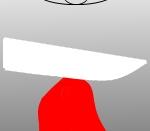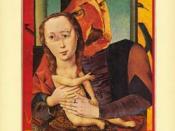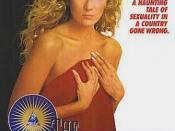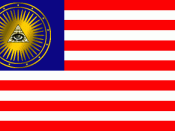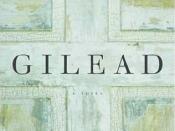What impact does the structure of chapters 1-12 have on our understanding of character and themes in The Handmaid's Tale By looking at the structure of the novel throughout chapters 1-12, I can begin to understand the roles of the characters and the impressions they leave on readers. As I read about Offred the narrator of the novel, I begin to understand that throughout the novel she feels isolated and scared, but she manages to survive in the present as she has a sense of double vision, she is a survivor from the past and her power to remember the past and her longing to reunite with her daughter enables her to survive. Her flashbacks of the past help her to escape the feelings of isolation, loneliness and boredom for when she sits in her room with nothing to do. Offred comes across as an untrusting person as she does not trust the reader with her real name due to the precarious situation she has been placed within the society.
Offred can be described as a curious, observant character as she notices physical details in her surroundings. This can be seen in chapter 2 where she inspects her room slowly and even manages to see the faint writing in the darkest corner left behind by the previous handmaid. It can also be seen by her very lyrical response to the Commander's Wife's garden when she observes its seasonal changes closely as she sees the garden as a source of beauty not denied by the society's regime. Offred also seems to use the garden as a silent testimonial to her own resistance.
Offred puts across her attitude of being discreetly subversive but not openly rebellious as she gets satisfaction from teasing the young guard at the gate as she passes through to go shopping with Ofglen from chapter 4, "'I enjoy the power; power of a dog bone, passive but there". This gives the impression to the reader that Offred is mischievous but that she yearns for communication and trust between people instead of suspicion and isolation which the society has placed upon them. From her flashbacks of Luke, we realise she feels a sense of loneliness in her life which is enhanced when she and the Commander use familiar social and sexual codes from the old society when she meets him privately.
Offred comes across as a lively person when she plays scrabble with the Commander and this is the first time in the novel when she laughs revealing a reawakening of her own high spirits. She is a highly self conscious narrator as she accuses herself of cowardice and unreliability but we see her as a woman of high integrity as she survives with dignity and embraces the possibility of her escape with hope.
Moira is a strong character within the novel who provides an impression of female heroism although seen as a rebellious figure by the Gileadian society as she escapes by stealing the uniform of an aunt. Moira provides humour and irony to the reader as can be seen when they are in the centre where she represents a role model to the other handmaid's who want to rebel but don't dare to. She can be seen as a hero as she provides images of hope to the women who hate the new society. Moira likes to rebel against the claim that Gilead promotes solidarity between women, where in fact it only produces suspicion, jealousy and hostility, as can be seen when the pregnant handmaid enters the shop and the handmaid's scowl at her. She is a strong character as she is not scared to stand up to authority, and strongly opposes Gilead as she is a lesbian which goes against the male - female relationships that Gilead only values.
Serena Joy, the Commander's Wife, can be understood as the most powerful female presence in Offred's life in Gilead. She is a vengeful, uncaring woman who uses Offred to her own gain in order to have a child of her own. She is uncaring as she withholds information from Offred about her daughter and then uses it to her own advantage. It can be clearly seen that Serena shows a lot of resentment and jealousy towards Offred as she is uncomfortable with the whole arrangement of having to share her home and her husband with a complete stranger, as she considers it a violation of their marriage. She also comes across as very possessive of her husband, "As for my husband, she said, he's just that. My husband. I want that to be perfectly clear. Till death do us part. It's final". The reader may begin to feel sympathetic towards her because she feels trapped in the home, sitting in the garden knitting and smoking to keep her occupied from the feeling of loneliness. This is indicated in chapter 8, "She stays in her home, but it doesn't seem to agree with her".
Serena generates an impression of toughness as she sits in the garden cigarette-smoking and her use of slang. Serena's obvious unhappiness gives her a chance of inspiring our sympathy, but she loses our sympathy as she takes out her frustration on Offred. She seems to possess no compassion for Offred and cares only for her own feelings as she only sees the difficulty of her own life, and not that of another woman such as Offred. Serena demonstrates her unhappiness through her interactions with Offred, and with the description of her smoking, as she puts out her cigarette in one long, grinding motion showing her powerlessness in the society. The aunts demonstrate the theme of violence within the novel as they are the ones who are responsible for the punishments to the handmaids, and are signified by their khaki uniforms and their cattle prods. Ofglen and Ofwarren can be described as courageous and rebellious as they are both members of the resistance against Gilead, making them similar to Moira. Offred and the reader does not know about ofglen's past life which gives the impression of mysterious. Ofglen also comes across as someone trusting of others as she confides in Offred that she is a member of the Mayday resistance movement. Ofglen comes across as a caring person as she knocked the alleged rapist out at the "birth party" before the horrible torture began as he was a member of the resistance. She also dies as a fighter preferring to commit suicide when she sees the black truck coming rather than betray her friends, depicting her of a loyal and noble character.
The structure of the novel reveals the Commander as an ambiguous, shadowy figure whose intentions for Gilead remain unclear to Offred. He presents an image of male power, isolated from his Wife and his Handmaid. He comes across as mysterious through his actions when Offred sees him in chapter 8 lurking in the shadows outside her room trying to peer at her as she passed: "Something has been shown to me, but what is it?" He is a lonely man who desires friendship, companionship and intimacy with Offred, which is shown when he asks her to visit him "after hours" in his study. He comes across sympathetic and friendly toward Offred than most other people, and Offred's evenings with the Commander in his study offer her a small refuge from the ideals of her handmaid's duties. His unhappiness and need for companionship make him seem a prisoner of Gilead's strictures as anyone else, and leads to the reader and Offred feeling sympathy for him.
However, Offred and the reader recognize that if the Commander is a prisoner, he is a prisoner of a society that he himself helped construct. We begin to realise that his visits with Offred are selfish as they are only to satisfy his need for companionship, and he doesn't seem to care that they put Offred at terrible risk. His responsibility for the creation of Gilead, the fact that he feels he's the only one who can break his own rules, and his selfishness to the hell he created for women means that he is a monster.
Nick presents himself as a mysterious dark stranger who is a rescuer for Offred's love. He doesn't mind taking risks as he winks at Offred the first day he sees her, and presses his foot against Offred's at the household prayers. He appears as a comic figure during the day, but at night he becomes Offred's romantic lover.
The structure of the novel helps us to identify the themes contained within the first 12 chapters of the novel. One important theme is that of women seen as political instruments, since Gilead was formed in response to the crisis of decreased birth-rates, it has focused towards one single goal, the control of reproduction. The Gilead government decided to tackle the problem head on by assuming complete control of women's bodies through their political ideals. As a result, women were stripped of their rights, the right to vote, hold property or jobs, read, etc.
Another important theme in the novel is that of language used as a Tool of Power. Gilead created their own vocabulary in order to meet with the new society's elite and create titles for men defined by their military rank, and defining women by their marital status, fertility, age, etc. They were stripped of their permanent individual names and thus stripped them of their individuality. New names were created for feminists and deformed babies, denoted by the terms "Unwomen" and "Unbabies." I consider the most important theme is power, because the society has removed power from everyone. Power is given to individuals, such as the commander arranging to meet Offred in his office he shows us that Offred has something that he wants, this gives her some power as she can bargain with him in exchange for gifts, e.g. hand lotion and information. Offred constantly tries to obtain any power she can by using her body "we still had our bodies". She uses her body to tease the guards as she walks away swaying her hips, she thinks about using her body as a way of bargaining with the angels to escape the red centre. Everyone is trying to gain as much power as they can as power equals hope and knowledge is power which is why Offred wants info from the commander on the underground resistance in order to give her hope. Serena also has power; by the way she addresses Offred at their first meeting. She treats her as a business transaction to provide her with a baby, not as a person. At the ceremony she digs her rings into Offred's arm.
Another theme is violence; this is placed in the novel in order to show how Gilead is trying to control people. The opening chapter includes methods of violence and restriction by mentioning guns, cattle prods, and barbed wire. Violence is also depicted through the use of the colour red because it is the colour of blood. The colour of red used throughout the novel also ties in with the theme of symbolism of fertility as the reference to red and the moon represents the menstrual cycle and therefore fertility. As is the descriptions of the tulips and flowers representing fertility.
Another theme depicted in the novel is the theme of colour. Red is referred to a lot in the novel such as on handmaids representing uterine blood, passion, anger, menstrual cycle, fertility. The Marthas wear green representing a neutral colour as pH7 on indicator paper is neutral and it turns green, could also mean envy, greed, money. The Daughters wear white because it symbolizes purity and innocence. The Wives wear blue due to an old marriage custom (something old, something new, something borrowed something blue). Wearing blue is supposed to represent faithfulness. It is also considered a cold colour, echoing the wives inability to reproduce. The colour grey is used for "unwomen", it is symbolic as to their inhuman status, oppressed women always wear grey if they are considered subhuman. Blue is also a colour associated with the Virgin Mary, suggesting that the act of ceremony is related to the immaculate conception of Jesus, without undergoing the sexual act.
